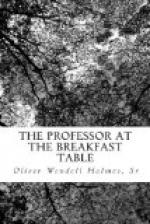And now the days had come for our little friend, whose whims and weaknesses had interested us, perhaps, as much as his better traits, to make ready for that long journey which is easier to the cripple than to the strong man, and on which none enters so willingly as he who has borne the life-long load of infirmity during his earthly pilgrimage. At this point, under most circumstances, I would close the doors and draw the veil of privacy before the chamber where the birth which we call death, out of life into the unknown world, is working its mystery. But this friend of ours stood alone in the world, and, as the last act of his life was mainly in harmony with the rest of its drama, I do not here feel the force of the objection commonly lying against that death-bed literature which forms the staple of a certain portion of the press. Let me explain what I mean, so that my readers may think for themselves a little, before they accuse me of hasty expressions.
The Roman Catholic Church has certain formulas for its dying children, to which almost all of them attach the greatest importance. There is hardly a criminal so abandoned that he is not anxious to receive the “consolations of religion” in his last hours. Even if he be senseless, but still living, I think that the form is gone through with, just as baptism is administered to the unconscious new-born child. Now we do not quarrel with these forms. We look with reverence and affection upon all symbols which give peace and comfort to our fellow-creatures. But the value of the new-born child’s passive consent to the ceremony is null, as testimony to the truth of a doctrine. The automatic closing of a dying man’s lips on the consecrated wafer proves nothing in favor of the Real Presence, or any other dogma. And, speaking generally, the evidence of dying men in favor of any belief is to be received with great caution.
They commonly tell the truth about their present feelings, no doubt. A dying man’s deposition about anything he knows is good evidence. But it is of much less consequence what a man thinks and says when he is changed by pain, weakness, apprehension, than what he thinks when he is truly and wholly himself. Most murderers die in a very pious frame of mind, expecting to go to glory at once; yet no man believes he shall meet a larger average of pirates and cut-throats in the streets of the New Jerusalem than of honest folks that died in their beds.
Unfortunately, there has been a very great tendency to make capital of various kinds out of dying men’s speeches. The lies that have been put into their mouths for this purpose are endless. The prime minister, whose last breath was spent in scolding his nurse, dies with a magnificent apothegm on his lips, manufactured by a reporter. Addison gets up a tableau and utters an admirable sentiment,—or somebody makes the posthumous dying epigram for him. The incoherent babble of green fields is translated into the language of stately sentiment. One would think, all that dying men had to do was to say the prettiest thing they could,—to make their rhetorical point,—and then bow themselves politely out of the world.




